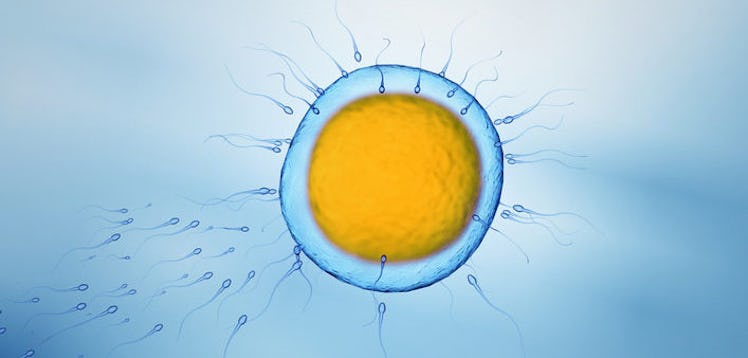Blame Monogamy For Male Infertility
Physiological changes take place in as few as 27 generations and marriage has been around longer than that.

Leigh Simmons, Editor-in-Chief of the esteemed journal Behavioral Ecology and Australian Research Council Fellow, is amazed that human testicles and the sperm that they produce can get the job done. Proportionally, homo sapiens have small balls and Simmons credits this, at least in part, to humans’ small mindedness about sexuality. A lack of “Sperm Competition” has decreased male potency by allowing for the survival of some pretty slow swimmers.
“If you look across species, those that have low levels of sperm competition tend to have smaller testes and lower sperm production capacities than species where sperm competition is much stronger,” Simmons explains. “That’s a very widespread phenomenon.”
The theory of “Sperm Competition” emerged in the 1970s thanks to Geoff Parker, a Darwin Medal-winning evolutionary biologist Simmons considers a scientific father figure. The idea is fairly simple (at least in the evolutionary sense): When females of a species normally mate multiple males, the males of that species have a better chance of passing on their genes if they have faster, healthier, more plentiful sperm capable of winning a race to an egg. When fertilization is the finish line, the biological pressure is exerted on the testes and they grow to meet that challenge.
The reverse is also true. A full 10 to 15 percent of U.S. couples have struggled with fertility. About half of the time the issues can be traced to the man. That’s why 7.5 percent of men under 45-years-old have checked in with a fertility doc, and 18 percent of those have walked out of the offices with an infertility diagnosis. In a totally scientific sense, marriage shrinks balls.
Those effects can be observed in other species over shorter periods of time. Simmons worked with generations of related beetles and found that when beetles are forced into monogamy, they develop smaller testes and have lower sperm quality than free love beetles. Physiological changes take place in as few as 27 generations. To put that in perspective, human anatomy could be substantively altered in 500 years. In actuality, mating rituals have had a lot longer than that to minimize testicles.
Simmons remained focused on beetles until he was spurred to do human research by a program he saw on television, which featured a colleague making “outrageous claims.” After deciding that he needed to find stronger proof that sperm competition had and was affecting humans, Simmons went to have an awkward conversation with the dean of his university. He explained to his boss that he planned to download pornographic images to test the ejaculate of men exposed to images of a high sperm competition scenario. Practically speaking, that meant he needed to go find some images of male, male, female (MMF in internet-speak) threeways.
He did and the results were impressive.
“Men were producing ejaculates with faster swimming sperm when they viewed images with other men in them,” Simmons says. “It was a really striking result for me.”
But what did it mean? Simmons concluded that the human male reproductive system reacts to visual stimuli that suggest sperm may have to compete with other male sperm, making the sperm swim faster. Our bodies can still do this even though it has not been a key evolutionary trait for millennia. Even as male fertility decreased over thousands of years of mutually acknowledged relationships, male’s genitals still remained clutch.
Over the last 11 years, Simmon’s has gone back to insects to figure out why exactly this is the case. He believes it’s due to chemical changes in the seminal fluid, which are produced by the body prior to ejaculation, during the arousal phase. But he doesn’t think the takeaway for men is to look at MMF porn prior to having sex. He believes the message of his research, for men, is much more about comfort.
“If men are having troubles with their partner’s conceiving, there’s a great tendency for people to think, ‘There’s something wrong with me. I’ve got some illness. I’m not well,’” says Simmons. “Actually, it’s the normal human condition.”
Simmon’s acknowledges that this is cold comfort.
“I know that doesn’t help them have a baby,” he says “But psychologically, it’s better for men not to think there’s something wrong with them.”
There isn’t. There’s something wrong with monogamy.